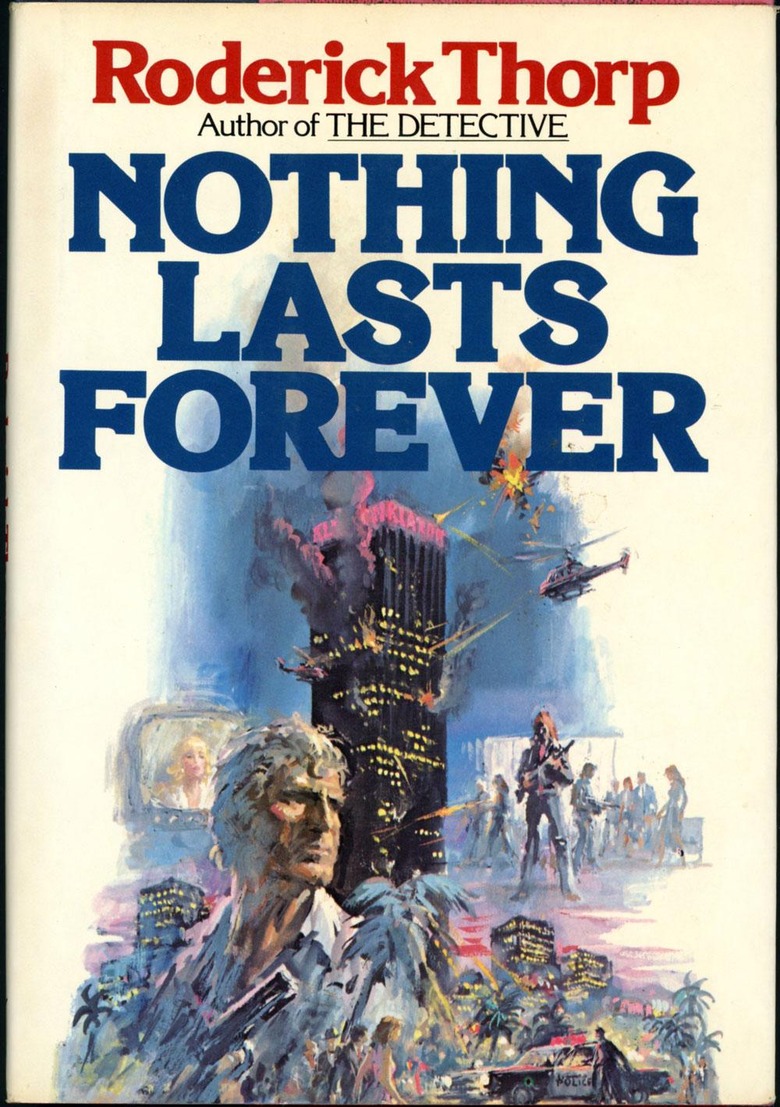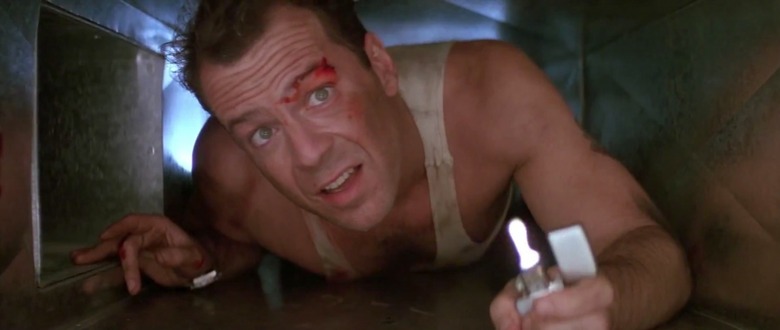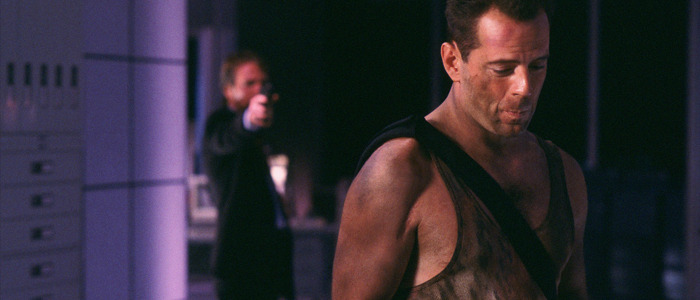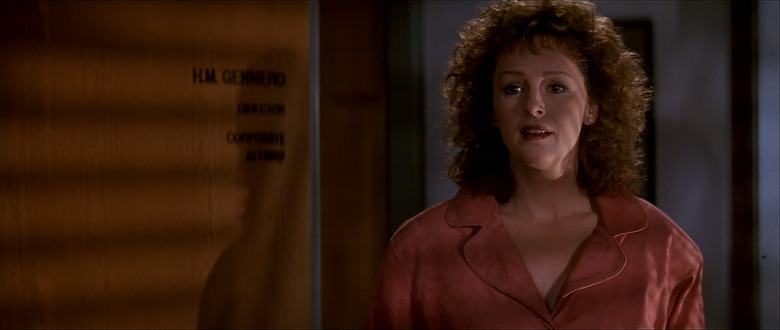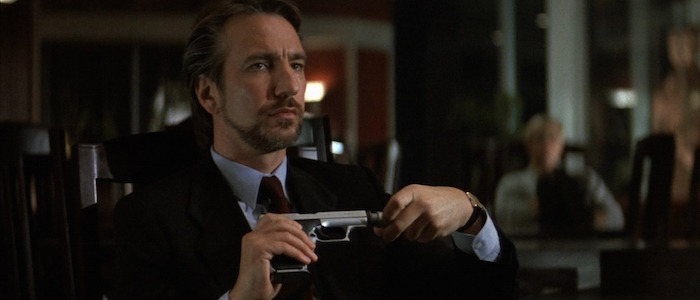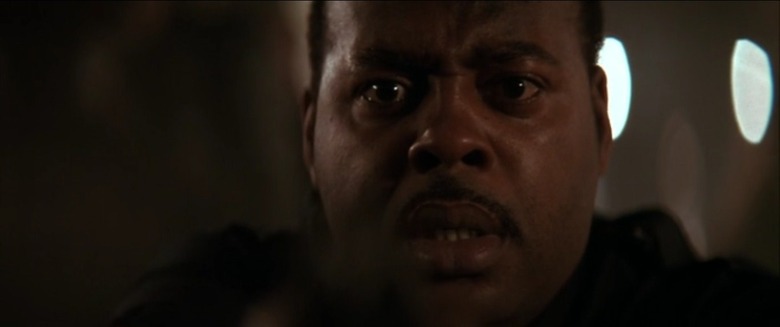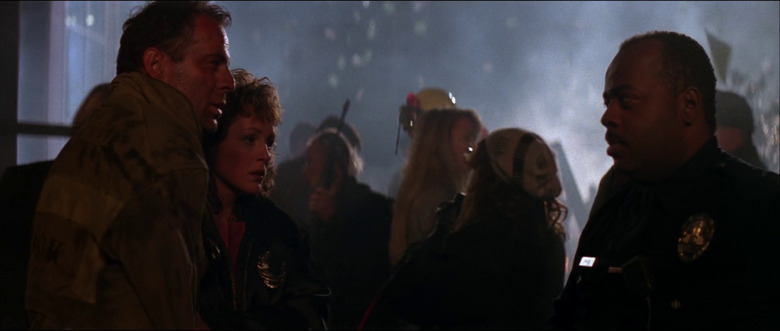Nothing Lasts Forever: Comparing 'Die Hard' To The 1979 Novel That Inspired It
(This week marks the 30th anniversary of Die Hard, arguably the greatest action movie of all time. To celebrate, /Film is exploring the film from every angle with a series of articles. Today: a look back at the 1979 novel that inspired the film.)There are few movies that bring me pure, unadulterated joy the way John McTiernan's Die Hard brings me joy. Recently, I flew from New York to Los Angeles for the first time and as I looked around the Los Angeles airport, I couldn't help but shake my head and say "California" with pure disdain. In truth, I have no beef with the state, but I had just traveled the same route that John McClane took nearly 30 years earlier and I wasn't going to miss my opportunity of recreation.In fact, the purpose of this trip was to celebrate my birthday with a Die Hard drinking game party. I visited Fox Plaza (the real Nakatomi Plaza), soaked in the lobby (which looks similar despite the Peet's Coffee), and stole a rock from the courtyard as a souvenir (don't report me).After 30 years, Die Hard remains the best and most quintessential action film of all time. If you hold this movie close to your heart, well, welcome to the party, pal. But the film began its life as something very different: a 1979 thriller novel called Nothing Lasts Forever.In honor of the Die Hard's 30th Anniversary, I recently read Nothing Lasts Forever and was surprised to discover just how much Hollywood had altered. With very few exceptions, screenwriters Jeb Stuart and Steven E. de Souza made all the right calls in their adaptation of the book. While the harrowing tale of an old man losing his last morsel of humanity during a hostage crisis is certainly compelling, the book lacks all of the fun and charm of the film. It was an enjoyable read, but it's dated, something that can't be said of Die Hard.
The Book That Inspired Die Hard
The Die Hard we know and love today wasn't always the tale of John McClane and Hans Gruber in the Nakatomi. Based on Roderick Thorp's novel, Nothing Lasts Forever, Die Hard was originally meant to tell the story of Joseph Leland, a much older cop who was already an established literary character. Nothing Lasts Forever (1979) was a sequel to The Detective (1966), which was adapted into a movie starring Frank Sinatra in 1968. Crazily enough, that means Die Hard was originally meant to star a 73-year-old Frank Sinatra instead of a 33-year-old Bruce Willis. Can you imagine the stair-climbing alone?We all know there are similarities between Die Hard and The Towering Inferno (1974), but there's an even deeper connection between the films. After seeing that disaster movie, Thorp had a dream about a man being chased around a skyscraper and just like that, he decided the premise would make a perfect sequel to his successful book.
John McClane vs. Joe Leland
John and Joe are certainly cut from the same cloth. They're both buried in their work, stubborn, closed-off, and tough. However, they're in completely different stages of their life when that fateful Christmas Party strikes. As we know, John is trying (poorly) to win back his wife, who left him for a job opportunity in LA. He's still a cop and he uses that as the excuse for why he didn't follow her across the country. Of course, we know that's bullshit. As Holly so gracefully puts it, "It didn't do anything to our marriage, except maybe change your idea as to what our marriage should be." This is one of my favorite lines in the entire film, because it tells you everything you need about their relationship.Joe Leland, on the other hand, is retired and pretty worn down from his long life of bad relationships, alcoholism, and work-related horrors. John still has young kids while Joe has grandkids who barely know him. Basically, John still has room to repair his relationships whereas Joe can only reflect on the past. The biggest difference between Die Hard and this book: hope.
The Story
Leland spends much of the book reminiscing about his time during WWII, his bleak days as a cop, and the fact that he wasn't a notable husband or father. It gets deep and emotional, and while it definitely works, we should all be thankful the movie didn't take this route. First, flashbacks would have taken us out of the cinematic experience. The real-time energy is what makes the movie so special. Second, we know everything we need about John McClane within the first few minutes of the movie. He's been a cop for 11 years, he doesn't like LA, he's territorial, grumpy, sexy (as proven by the flight attendant who eye-fucks him), and despite his dysfunctional way of showing it, he loves his wife. We didn't need flashes of John and Holly fighting in New York or John beating down baddies on the mean streets. It's all in the early dialogue.The flashbacks work better in the book because there's a greater sense of mortal danger for Leland. Joe is more seriously injured than John, is incredibly sleep deprived, and spends much of the book thinking he's going to die. While the movie treats us to the very touching bathroom scene in which John gives Al his goodbye message to Holly, we never really believe John won't survive the night. However, John McTiernan does a successful job of carrying over the book's claustrophobic vibes. As soon as the Nakatomi locks down, you immediately think, "We are in it now!"
Holly Gennaro vs. Stephanie Gennaro
One of the biggest differences in the book is the Holly character, named Stephanie on the page. She's still an important figure in the building's company, but she's Joe's daughter, not his wife. The only true similarity between Stephanie and Holly is the last name. (Fun Fact: Holly's name changes from "GennAro" to "GennEro" when John is looking at the computer directory. Her office door says "GennEro" but the end credits say "GennAro". It's "GennAro" in the book, so I'm deeming that the official spelling.)Bonnie Bedelia's portrayal of Holly Gennaro is fierce, smart, and she makes it clear she isn't here for John's misogynistic tendencies. Stephanie Gennaro has a complicated relationship with her father and her shady deals while working for Klaxon Oil (not Nakatomi) are partially why the "terrorists" target the building. She's also (ugh) sleeping with Ellis, who is exactly the same as he is on screen. We love to hate Ellis, so it's sad to think there's a version of the story where Holly was sitting in his cushy office, doing coke over business deals. It's a relief to know the film version of Gennaro never saw his advances as anything but comical. We don't see much of Stephanie in the books, and what we do see is all through Joe's opinion of her, which is loving but judgmental.
Hans Gruber vs. Anton Gruber
The most disappointing part of the book is Gruber, whose official name is Anton "Little Tony The Red" Gruber. One of his lackeys is actually named Hans, which must roll better off the Hollywood tongue, hence the change. There's no question that Alan Rickman's captivating performance is the best part about Die Hard, and it's even more impressive when you realize he had little source material to work with. Anton is ruthless and purely evil, but he lacks the charm and swagger that Rickman eventually brought to the role. In fact, he is hardly in the story at all. Since the book is told entirely from Leland's perspective, you don't get the same sense of who the other characters truly are.
Supporting Characters
Die Hard has one of the best supporting casts in cinema history. While none of the terrorists or Argyle (who is just an unnamed older gentleman from Compton in the book) get their big moments on the page, some characters still resemble the ones we've grown to love. Al Powell, for example, is basically the same with the exception of age. Book-Al is only 22, whereas Reginald VelJohnson was 35 when he donned the sergeant uniform. He even gets the distinct pleasure of killing Karl in the end, a moment that makes me well up every single time I watch the movie.Deputy Chief Dwayne T. Robinson is also consistent, right down to his infuriating and laughable ignorance. It's no surprise they cast Paul Gleason, who proved his ability to play an imperceptive a**hole in The Breakfast Club. However, the book version of Dwayne eats it when Karl's final shot misses Leland and strikes him instead. Even more tragically, he never gets to say, "We're gonna need some more FBI guys, I guess."The Takagi character is named Mr. Rivers, who is not Japanese, which was unanticipated considering one of the best things about Die Hard, aesthetically, is the modern Japanese decor of the office. It's hard not to picture James Shigeta as the calm, cool boss who meets a tragic end. One of the SWAT cops in the film is named Rivers, though, which could be a nod to the original character.Surprisingly, the book does have one element that I wish was in the film: the presence of multiple female terrorists. Now, these women don't do much other than get killed by Leland and serve as a catalyst for his inner turmoil and the terror he feels as each kill becomes easier. Perhaps the studio thought McClane would be less likable if he was out there murdering women, which is understandable, but the visual of badass ladies roaming the building in their berets would've meant a lot to young me. We need more female villains!Remember the flight attendant who eye-fucks John like he's the First Class snack? Well, in the book, her name is Kathi Logan and Joe spends the flight with her, getting his flirt on. Not only is Joe divorced, but his ex-wife has died. Eventually, he asks for Kathi during the takeover and they chat via radio for a chunk of the story. In comparison to John and Holly, this is an incredibly weak romance.
The Ending
Since the basic structure and action of the book are the same, the ending comes as a complete curveball. Gruber still goes out the window, but Stephanie goes with him! After all of this horror, Leland manages to save almost everyone in the building except his only child. It's pretty dark and devastating. Can you imagine if Holly would have died at the end of Die Hard? People would have rioted! We need that hopeful limo kiss as Argyle exclaims, "Man, if this is their idea of Christmas, I gotta be here for New Year's!"

